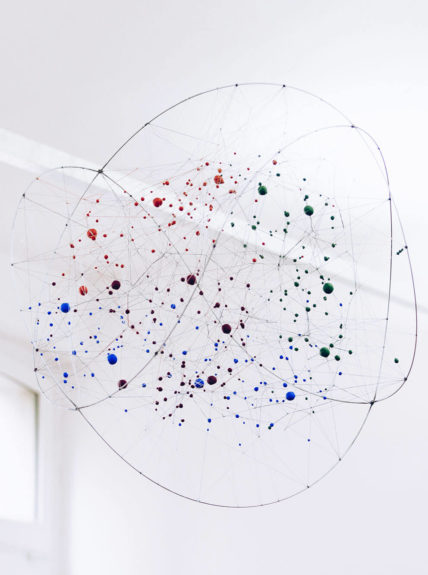
November 14, 2016
Tactical Tech: Tracking Your Digital Footprint
Our relationship with technology has drastically changed in the past decade. Happenings like the Arab Spring demonstrated the role of social media in organizing activists while the Snowden revelations unveiled a new light on digital security in our current technological landscape.
As our environments continue to change at breakneck speed, it’s becoming increasingly difficult to thoroughly understand how emerging technologies are fundamentally transforming the way we live, understand ourselves and the structures of society. Take a moment and think about the last time you encountered a privacy policy update. Did you actually take the time to comb through it before checking the ‘I agree’ box? Probably not. Don’t feel guilty though, because you’re not the only one and – apparently – reading all the privacy policies you come across in a year would take about 76 work days.
Enter Tactical Technology Collective, a non-profit organization made up of technologists and activists working together to demystify issues and debunk common arguments related to data, technology and politics. Founded in 2003 by Stephanie Hankey and Marek Tuszynski, the Berlin-based collective has developed practical tools and projects aimed to help individuals and organizations better understand digital security and the politics of data.
We recently visited Tactical Tech’s headquarters and spoke to the co-founders to learn more about whether you can reduce your digital footprint, the general lack of critical reflection when it comes to using digital services and how the data business model is shifting power structures in society.

Tactical Technology Collective has evolved through various phases over the years. What would you say is the organization’s main mission right now?
Stephanie: Our mission hasn’t changed much since the beginning, it’s just that we’ve differentiated with our strategy and the kind of work we’re doing at a certain point in time. Overall, the mission is the same in the sense in that we want to look at a very practice-based approach to the way in which technology changes and affects our political, social and economic environment. However, what we’re focusing on and how that works for the external environment shifts over time – I suppose that’s how you stay relevant.
It is virtually impossible these days to avoid leaving a digital trail through our online activities. Can you talk about one of your key projects, Me and My Shadow, which helps Internet users tackle this issue?
Stephanie: Me and My Shadow is a project that we started for people who are feeling unsure about their usage of technology or how their data is being used. It’s a place for them to explore these questions – first and foremost – and it’s also a place for them to try things out. Very often when we talk to people, they say they’re interested in this topic but are unsure about what they can actually do about it, so we’re trying to make this more tangible. We’ve probably gone past the point of controlling or understanding where your personal data is, but it doesn’t mean you can’t do small things to help reduce the footprint of that data or to think about choices you can make differently. On the site of the project, we outline a set of strategies and tips – there are so many things you can do.

“We've probably gone past the point of controlling where your personal data is, but you can still help reduce the footprint of that data.”
A significant part of Tactical Tech’s work is about demystifying topics in the areas of digital security and internet privacy. What do you think are some of the most misunderstood and under-reported issues in this space at the moment?
Stephanie: One thing is this discussion about what we could call the “nothing to hide” argument when it comes to using technology. Many people understand in principle that by using technology, their data is being taken and companies will use it to learn something about their activities, but they understand it as a problem for other people and don’t see it for themselves. I think breaking down the “I don’t mind, I have nothing to hide” argument is an interesting question because each individual has a different reason to care – from very personal situations through to larger issues about national security, digital surveillance and so on.
Marek: I would say people don’t link their fascination with technology and how it is used personally with the forces behind it and the business models that are driven by data. What’s even more important is that this data is accumulated and organized by a very small number of companies, which then leads to a massive accumulation of wealth. For us it’s interesting to see so little debate about what this accumulation of knowledge, data and wealth can do to institutions in terms of power. What is the relationship between this new growing force versus the old forces that have much less knowledge now, like governments, states, international institutions? This shift in power is something that hasn’t been addressed enough.

“People don’t link their fascination with technology with the forces behind it and the business models driven by data.”
Earlier this year, you both co-curated an exhibition, titled ‘Nervous Systems’, that touches on this topic. Can you talk about how it evolved into a standalone project that will be launched in New York in collaboration with Mozilla later this year?
Stephanie: The White Room project is an installation we did in Berlin as part of the ‘Nervous Systems’ exhibition at the Haus der Kulturen der Welt this year. When you walk in, it’s all white and looks like a technology store with a twist. Instead of products there are different kinds of projects and a bar staffed with InGenious workers, so people who give advice about technology, digital security and metadata investigations. Here in Berlin we had more than 10,000 visitors in nine weeks and got really good feedback on it. So we’re now bringing it to New York as a pop-up store in SoHo over Thanksgiving and Christmas. The project brings these issues to life and makes them tangible so people can try things, interact with them and talk about.
Are there any broad technological shifts you think will come up in the next decade that will influence the way tech can be used in society and campaigning?
Stephanie: I think there are two things. First, the data business model isn’t going to go away. The first wave of the web was about brilliant resources that nobody could pay for. Now, they’ve monetized it and it’s kind of taken off like wildfire. Data is king, if you like, not just with technology companies, but more broadly – to all sorts of companies, including transport, clothing, etc… they’re all collecting data. Not only is this is going to completely shift the way services are delivered to us, but also the way decisions are made.
The other one is a cliche, but definitely going to be really interesting: the Internet of Things. We’ve basically gotten to a point where technology has such a huge impact on society that we don’t even know we’re using it. When technology gets so embedded to the point where we don’t even see it, it’s going to change the questions about how it shifts society.
Marek: The environment is developing so fast that the only thing that we can say right now is that it’s unpredictable and opening new alleys of understanding what data can be used for, how technology can develop as well as its impact on how we understand politics. What we may see is that it may go backwards as well.
“We've gotten to a point where technology has such a huge impact on society that we don't even know we're using it.”




